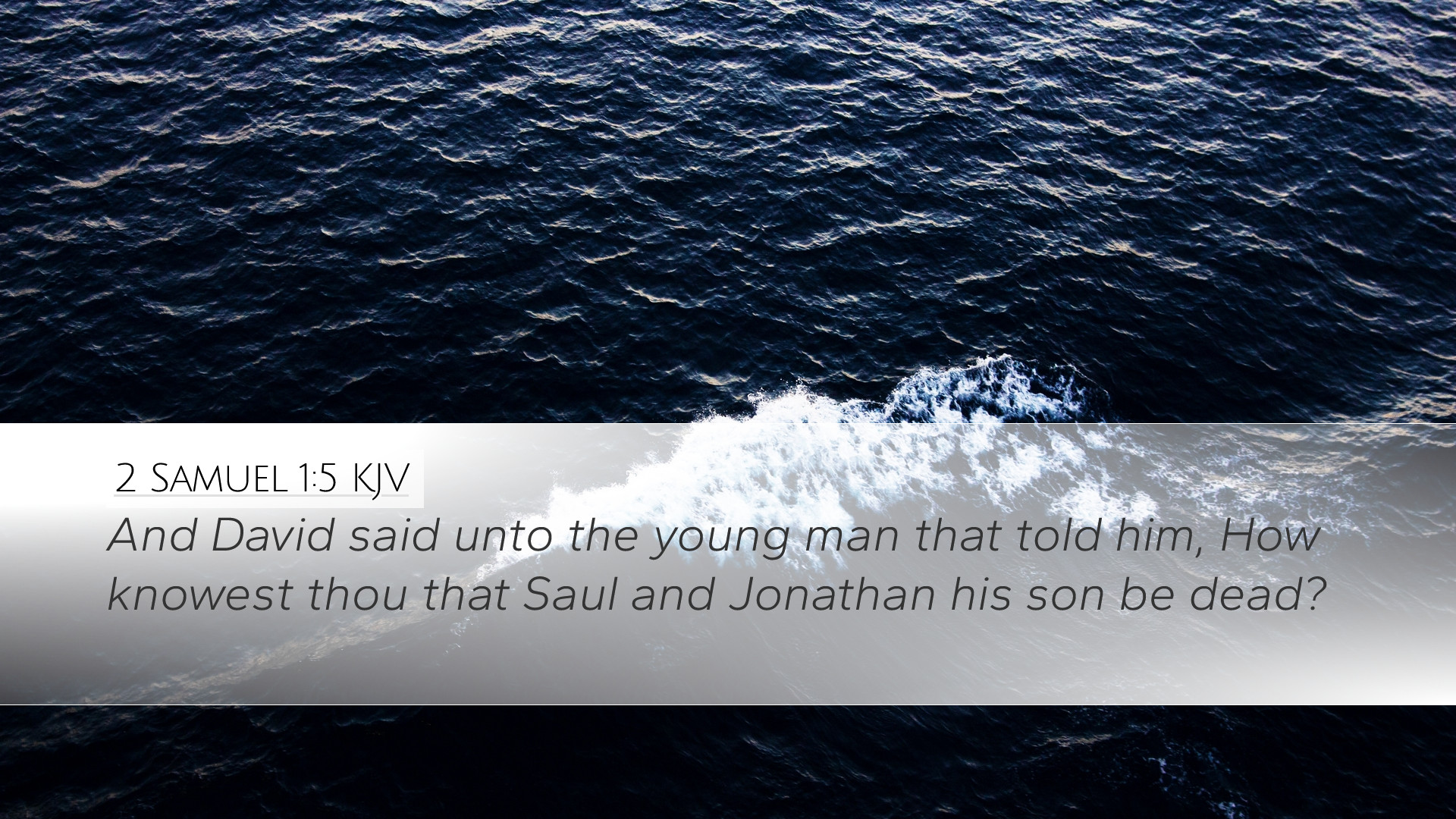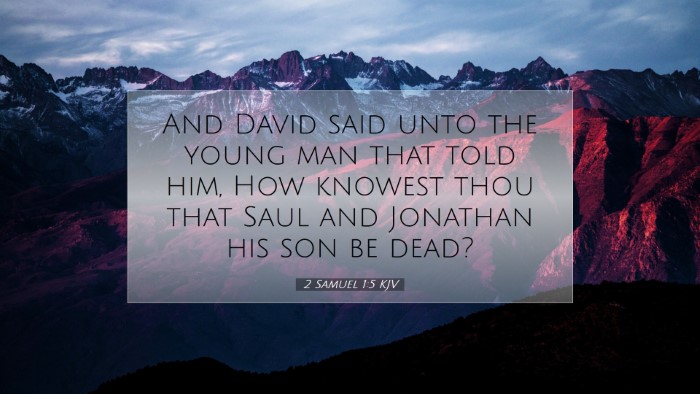Commentary on 2 Samuel 1:5
Bible Verse: "And David said unto the young man that told him, How art thou that dost know that Saul is dead? And he said, I happened by chance upon mount Gilboa, and there was Saul leaning upon his spear; and, lo, the chariots and horsemen followed hard after him."
Introduction
The narrative of 2 Samuel 1:5 encapsulates a pivotal moment in Israel's history, marked by the transition of power from Saul to David. This verse not only presents a historical account but also opens the door to profound theological reflections. Key commentaries, notably those of Matthew Henry, Albert Barnes, and Adam Clarke, provide valuable insights into the characters, the motives involved, and the implications of this significant event.
Understanding the Context
The context surrounding this verse is vital for capturing the emotional and political landscape of the time. King Saul's demise and David's ascension are not merely a historical footnote but are steeped in the divine providence and sovereign plan of God for Israel. As established in previous narratives, Saul’s reign was characterized by disobedience and decline, while David was anointed as God's chosen king.
Historical Context
- The shifting dynamics: Saul’s death marked a change not only in leadership but also in the hope for a united Israel.
- The implications for David: The news of Saul's death arrives at a complex time in David's life, being both a moment of potential joy and a source of moral dilemma.
The Role of the Messenger
David's engagement with the young man conveys insights into the nature of his leadership. The young man claims to have discovered Saul dead, yet his narrative is riddled with implications of opportunism. As Barnes elucidates, this young man’s approach to David exemplifies the duality of human ambition—both an act of betrayal and a misguided attempt to curry favor.
David’s Response
David's inquiry, "How art thou that dost know that Saul is dead?" serves multiple purposes. Firstly, it reflects his skepticism regarding the messenger's credibility. Secondly, it exemplifies David’s deep-seated respect for Saul, despite their fraught relationship (Henry). This response foreshadows David’s grief and the forthcoming lamentation that illustrates his capacity for compassion even towards his enemies.
Key Themes
- The complexity of human relationships: David’s complex relationship with Saul adds a layer of depth to this narrative.
- Grief and Mourning: David’s reaction to Saul’s death is emblematic of the mourning process, demonstrating an understanding that even kings must navigate the rivers of loss (Clarke).
Theological Implications
The death of Saul, viewed through a theological lens, signifies both an end and a beginning. It invites reflection on divine sovereignty and the often-mysterious ways God orchestrates events for His purposes. Clarke emphasizes that God’s providence does not exclude human agency; rather, it harmonizes with it. This interaction highlights the balance between divine will and human action.
David as a Type of Christ
In examining David's character, one might see parallels with Christ, who shows mercy and grace. Just as David mourned for Saul, Jesus exemplifies love even amid betrayal, leading to discussions on how leaders must often bear the burdens of those they lead, even when faced with treachery.
Practical Applications
For pastors and theologians, this passage sheds light on several practical applications:
- A Call to Integrity: Leaders must cultivate integrity and discernment in their dealings with others, as exemplified by David's careful questioning.
- Emotional Quagmire of Leadership: The challenges David faced highlight the emotional aspects of leadership—how to navigate personal grief and public expectation.
- Understanding God’s Sovereignty: Believers are reminded of the importance of trusting in God's plan, recognizing that His ways often transcend human understanding (Barnes).
Conclusion
2 Samuel 1:5 serves as a critical juncture in understanding the transition of leadership in Israel and the complexities of human relationships within that context. The insights gleaned from Matthew Henry, Albert Barnes, and Adam Clarke reveal a tapestry of emotion, providence, and the inherent moral challenges faced by those in leadership. As we delve deeper into this verse, may we be challenged to reflect on our understanding of grief, the nature of leadership, and the ever-present sovereignty of God in our lives.


